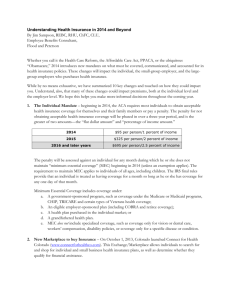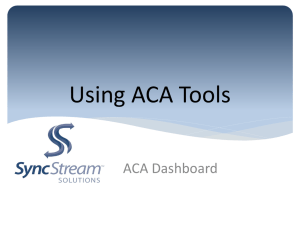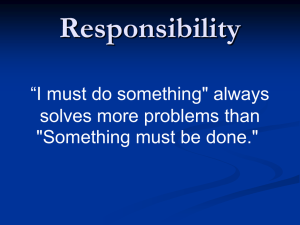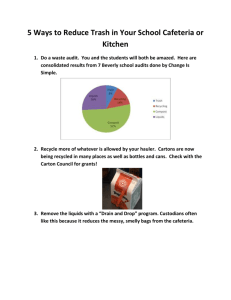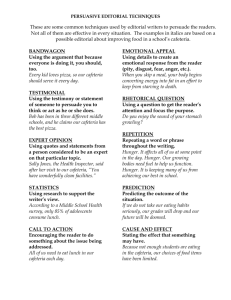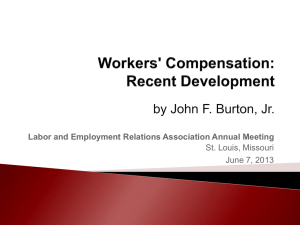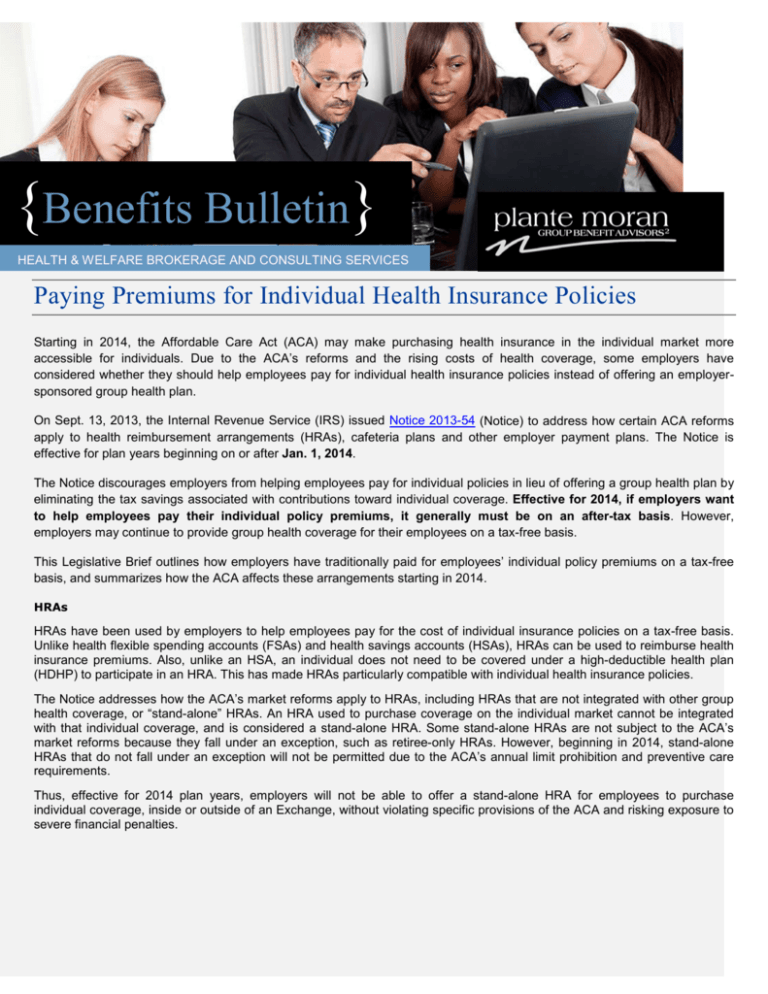
{Benefits Bulletin}
HEALTH & WELFARE BROKERAGE AND CONSULTING SERVICES
Paying Premiums for Individual Health Insurance Policies
Starting in 2014, the Affordable Care Act (ACA) may make purchasing health insurance in the individual market more
accessible for individuals. Due to the ACA’s reforms and the rising costs of health coverage, some employers have
considered whether they should help employees pay for individual health insurance policies instead of offering an employersponsored group health plan.
On Sept. 13, 2013, the Internal Revenue Service (IRS) issued Notice 2013-54 (Notice) to address how certain ACA reforms
apply to health reimbursement arrangements (HRAs), cafeteria plans and other employer payment plans. The Notice is
effective for plan years beginning on or after Jan. 1, 2014.
The Notice discourages employers from helping employees pay for individual policies in lieu of offering a group health plan by
eliminating the tax savings associated with contributions toward individual coverage. Effective for 2014, if employers want
to help employees pay their individual policy premiums, it generally must be on an after-tax basis. However,
employers may continue to provide group health coverage for their employees on a tax-free basis.
This Legislative Brief outlines how employers have traditionally paid for employees’ individual policy premiums on a tax-free
basis, and summarizes how the ACA affects these arrangements starting in 2014.
HRAs
HRAs have been used by employers to help employees pay for the cost of individual insurance policies on a tax-free basis.
Unlike health flexible spending accounts (FSAs) and health savings accounts (HSAs), HRAs can be used to reimburse health
insurance premiums. Also, unlike an HSA, an individual does not need to be covered under a high-deductible health plan
(HDHP) to participate in an HRA. This has made HRAs particularly compatible with individual health insurance policies.
The Notice addresses how the ACA’s market reforms apply to HRAs, including HRAs that are not integrated with other group
health coverage, or “stand-alone” HRAs. An HRA used to purchase coverage on the individual market cannot be integrated
with that individual coverage, and is considered a stand-alone HRA. Some stand-alone HRAs are not subject to the ACA’s
market reforms because they fall under an exception, such as retiree-only HRAs. However, beginning in 2014, stand-alone
HRAs that do not fall under an exception will not be permitted due to the ACA’s annual limit prohibition and preventive care
requirements.
Thus, effective for 2014 plan years, employers will not be able to offer a stand-alone HRA for employees to purchase
individual coverage, inside or outside of an Exchange, without violating specific provisions of the ACA and risking exposure to
severe financial penalties.
Benefits Bulletin
HEALTH & WELFARE BROKERAGE AND CONSULTING SERVICES
EMPLOYER PAYMENT PLANS
In Revenue Ruling 61-146, the IRS provided that if an employer reimburses an employee’s substantiated premiums for nonemployer sponsored hospital and medical insurance, the payments are excluded from the employee’s gross income under
Internal Revenue Code (Code) Section 106. This IRS guidance allowed an employer to pay an employee’s premiums for
individual health insurance coverage without the employee paying tax on the amount.
The Notice refers to this type of arrangement as an “employer payment plan.” An employer payment plan appears to also
include any tax-advantaged arrangement to pay for individual health insurance premiums, including employee pre-tax salary
reduction contributions paid through a cafeteria plan.
Similar to the guidance for HRAs, the Notice provides that an employer payment plan that reimburses employees for their
individual insurance policy premiums will not comply with the ACA’s annual limit prohibition and preventive care requirements.
Thus, effective for 2014 plan years, these plans will essentially be prohibited.
However, an employer payment plan does not include an employer-sponsored arrangement that allows an employee to
choose either cash or an after-tax amount to be applied toward health coverage. Thus, premium reimbursement
arrangements made on an after-tax basis will still be permitted.
CAFETERIA PLANS
A Section 125 Plan, or a cafeteria plan, can be used by employers to help employees pay for certain expenses, including
health insurance, on a pre-tax basis. The proposed cafeteria plan regulations from 2007 allow for the pre-tax payment or
reimbursement of individual health insurance policy premiums under a cafeteria plan. However, the ACA changes this rule
and prohibits cafeteria plans from paying or reimbursing premiums for individual health insurance policies, effective for 2014.
The ACA’s prohibition on including individual health insurance policies under a cafeteria plan applies to policies purchased on
an Exchange and through the private market, as follows:
•
Exchange Coverage: The ACA provides that individual health insurance offered through an Exchange cannot be
reimbursed or paid for under a cafeteria plan. Exchange coverage may be funded through a cafeteria plan only if the
employee’s employer elects to make group coverage available through the Exchange’s Small Business Health Options
Program (SHOP).
•
Non-Exchange Coverage: The Notice indicates that, effective for 2014, cafeteria plans may not be used to pay
premiums for individual health insurance policies that provide major medical coverage. However, it appears that this
restriction does not apply to individual policies that are limited to coverage that is excepted from the ACA’s market
reforms, such as retiree-only coverage, or limited-scope dental or vision benefits.
Thus, effective for 2014, the tax exclusion provided through a cafeteria plan is only available when group coverage is
purchased. Employers that want to contribute toward the cost of individual coverage must do so on a taxable basis.
The Notice provides a transition rule for certain cafeteria plans for plan years beginning before Jan. 1, 2014. For cafeteria
plans that as of Sept. 13, 2013, operate on a plan year other than a calendar year, the restriction on purchasing individual
Exchange coverage through a cafeteria plan will not apply before the first plan year that begins after Dec. 31, 2013.
However, individuals may not claim a premium tax subsidy for any month in which they are covered by an individual plan
purchased through an Exchange as a benefit under a cafeteria plan.
Nicole.Bramos@plantemoran.com
248.375.7419
Ed.Murphy@plantemoran.com
248.375.7412
Jenni.Gianotto@plantemoran.com
248.375.7212
Margie.Sacha@plantemoran.com
248.375.7291
Scott.McLellan@plantemoran.com
248.375.7281
Jonathon.Trionfi@plantemoran.com
248.375.7475
The information provided is only a general
summary and is being distributed with the
understanding that PM Group Benefit Advisors
II, LLC is not providing legal, tax, accounting, or
other professional advice, position, or opinions
on specific facts or matters and, accordingly
assumes no liability whatsoever in connection
with its use. Content ©2013 Zywave, Inc. All
rights reserved.

